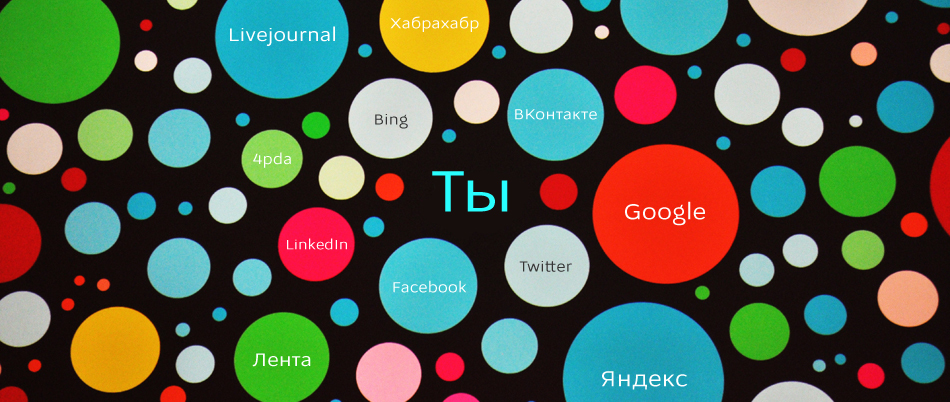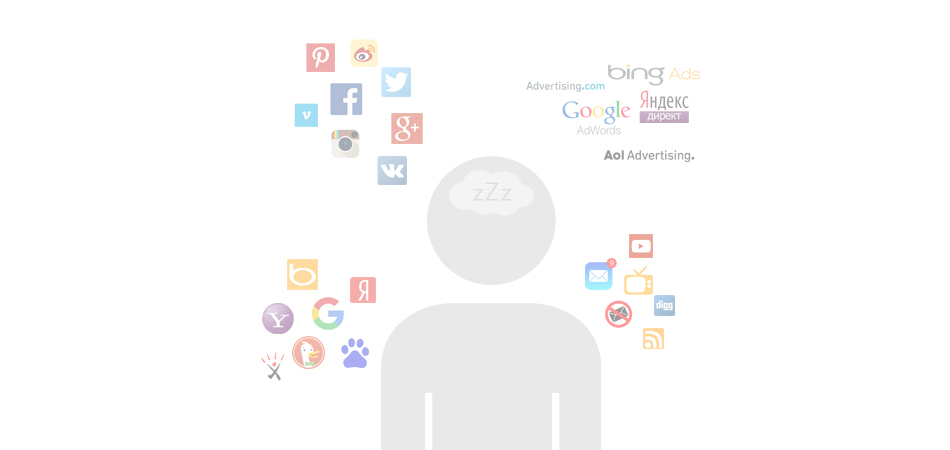What is a "filter bubble" and how to get out of it

On Habré many years ago there was an article about the so-called “filter bubble” or “filter of interests”. The point is that modern information systems accumulate huge amounts of data about each user, analyze, structure and ultimately decide what information to display on the screen. Is it good or bad? What can it threaten? How to control it? Is it even necessary to control?
All that is interesting and necessary for me to work, I get from the Internet. "The most common Internet user" is me. News, social networks, thematic sites, Google, Yandex - what you use daily. And I guess I'm not alone.
Every day we are inside our mini-Internet, the content of which depends on our search queries, interests, visited sites, viewed videos, clicked posts, and more heaps of parameters that are collected and saved. And that this is a vicious circle is almost imperceptible: you feel comfortable, because the links that Google gives out are based on your preferences, and in the Facebook feed, first posts are posted on a topic that interests you ...
')
Bubble guy
For the “phenomena” described above, they came up with a name - a bubble of filters (filter bubble). This concept was introduced by Eli Pariser. His main idea is that filtering and personalization limit us from new ideas, important information and create the illusion that our interests are, in fact, all that is interesting in the outside world. And you do not control what information to receive, you have already been selected.
As an example of the negative effect of the bubble filters, Eli described the situation when one user entered the query “British Petroleum” into Google and received only investment news about the company in response. Another user, having sent the same request, received information about the explosion of the oil platform Deepwater Horizon. Anyway, both pages with search results almost completely differed from each other. It turns out that the bubble effect may form an incorrect public opinion about the situations that are occurring. And you can use it!
Until I noticed that I was inside my filter of interests, I was really comfortable. Now, there is a desire, if not to get out of it, then at least to expand and control. And the truth, as Cypher from the first Matrix said: “Happiness in ignorance”.

We are selected from the filter of interests
It turns out this situation: on the one hand, personalization and filtering in the same search engines do a good thing: they show what we most often look at, look for, discuss. On the other hand, the “picture” is slightly distorted, and it becomes more difficult to find something new, because search engines will take into account previous requests, history of visits and everything else to produce results.
You can enable "paranoia mode":
- Use TOR - besides TOR, there are other anonymizers that mask your IP address. But be prepared that the download speed will decrease.
- Work in incognito mode - in all modern browsers there is an “incognito mode”. In this mode, the entered passwords, cookies, cache, search queries and addresses of visited pages are not saved.
- Disable cookies - when cookies are disabled, it will be more problematic to identify you on the network.
- Do not use social networks - if you are logged in to a social network, then the "loop" with your data will be pulled after you on other sites. Visiting sites where there are buttons like, sharing, repost and retweet, be sure that Facebook or VKontakte knows where you were and what you watched.
- Everywhere where you have accounts with personal information, prohibit the transfer of data to partner resources - you may not even know about it, but some services transmit / sell / share data with their users. Permission to this is in the user agreement, "which no one reads." In most cases, this option can be waived.
- Use blockers - third-party software that monitors the browser, blocks the loading of ads and the transfer of "unnecessary" requests.
- No login at all.
- Use pigeon mail, etc.
All these actions will allow a little depersonalization of you online. And you can easily get out of your filter bubble, well, or definitely increase it.
But personally, I am not particularly satisfied with the performance of all these manipulations. The only more or less convenient option is to install any utility that would prohibit the transfer of hidden requests and remove information noise. And even better if it is an extension for the browser, with a minimum of settings. Actually, I was looking for such a solution, but I couldn’t find a universal one that would suit me. In the process I installed and tested various extensions and plugins, for example:
Ghostery is an excellent extension that checks the pages you visit for the presence of third-party elements, as they are called "bugs." These can be social networking widgets, ads, invisible pixels, used to track user activity and analytics, etc. All this can be customized and blocked.
Protect My Choices - formerly called Keep My Opt-Outs. Removes targeted advertising from pages, but not all, but only those companies that participate in the DDA program. For Russia is not very suitable, but it works.
Do Not Track - adds a special header to each of your HTTP requests. Thanks to this visited site information is transmitted that you do not need to track. Although in fact, this feature can be enabled in the browser itself :)
Avast Online Security is an extension of Avast Antivirus, has the function of blocking various counters, trackers and analytics systems, prevents unauthorized links, etc.
AdBlock is probably one of the most famous browser extensions. AdBlock removes ads from pages. I think that there is no point in specifically describing the functions of this extension, by and large it is one - the removal of advertisements. Also, there are analogues: uBlock, AdBlock Plus, Adguard.
Disconnect is another extension that shows with which external resources and services the site is associated and of course allows you to block this content. There is an interesting link visualization feature.
There are many such extensions and it should be noted, there are no less users of these extensions. This is me to the fact that many are still concerned about the situation with the constant tracking of user actions. In the same article , there are comments about foil hats, paranoia and, my opinion, that there is no need to panic and frantically make a garden of 10 extensions that remove and block everything, go online only through a chain of 25 proxies and gloves. About you, and so everything is known. Because “everything that got into the Internet remains on the Internet.” You just need to know and keep track of what personal information and photos you leave on sites. In the future, this may not be a very good joke.

By the way, did you know that 250,000,000+ new posts appear on Facebook every hour? And this is only in one social network, what can we say about the entire Internet. About this, about how to get rid of information noise , what else there are interesting and useful extensions, a small comparison, I will try to write next time.
Source: https://habr.com/ru/post/295714/
All Articles